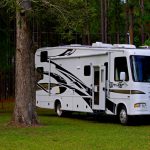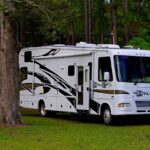Imagine waking up to a new breathtaking view every morning, sipping your coffee while overlooking a serene lake or a stunning mountain range. For many, this dream becomes a reality through RV living. But is it financially smart to ditch your traditional home for life on the road? 🤔 In this comprehensive guide, we explore whether living in an RV can save you money, the hidden costs you might not have considered, and how it stacks up against traditional housing.
With RV living becoming increasingly popular, especially among millennials and retirees seeking adventure, we dive into ten surprising insights that could change your perspective on homeownership. Did you know that many RVers find their overall living expenses decrease significantly? Or that the initial investment in an RV can be less than the down payment on a house? Stick around as we unravel the financial implications and lifestyle benefits of making the leap into RV living!
Key Takeaways
- Cost-Effective Living: RV living can lead to lower monthly expenses compared to traditional housing.
- Hidden Costs: Be aware of maintenance, insurance, and depreciation that can impact your budget.
- Freedom and Flexibility: Enjoy the freedom to travel and explore while maintaining a simplified lifestyle.
- Community Connection: RV living fosters a sense of community among fellow travelers, enhancing your experience.
- Initial Investment: The upfront costs of RVs can be significantly lower than purchasing a home.
If you’re ready to explore the RV lifestyle, check out our recommended products for RV essentials, including maintenance supplies, camping gear, and more!
👉 Shop RV Essentials:
- Camping Gear: Amazon Camping Gear
- RV Maintenance Supplies: Amazon RV Maintenance
- Books on RV Living: Best RV Living Books
- RV Insurance: Good Sam Insurance
- RV Financing Options: RV Financing on RVShare
Now, let’s dive deeper into whether living in an RV is the financially smart choice for you! 🚐✨
Table of Contents
- Quick Tips and Facts About Living in an RV
- The Financial Breakdown: Is RV Living Budget-Friendly?
- Cost Comparison: RV Living vs. Traditional Housing
- Hidden Costs of RV Living You Should Know
- Considering Full-Time RV Living? Here’s Why It Might Be a Smart Financial Move
- Enjoy a Greater Slice of the Great Outdoors: The Benefits of RV Living
- The RV Lifestyle: Freedom, Flexibility, and Financial Independence
- Financing Your RV: Tips for Smart Borrowing
- Insurance Insights: Protecting Your RV Investment
- Maintenance Matters: Keeping Your RV in Tip-Top Shape
- Lifestyle Adjustments: What to Expect When Living in an RV
- The Social Side of RV Living: Community and Connection
- Oh My, There’s Nothing Here! Common Misconceptions About RV Living
- Hello Camper! Tips for New RV Enthusiasts
- What Should I Call You? Choosing the Right RV for Your Needs
- Ask Away! Your RV Living Questions Answered
- Conclusion
- Recommended Links
- FAQ
- Reference Links
Quick Tips and Facts About Living in an RV 🏠🚐
Living in an RV can be a unique and exciting experience, but it’s essential to consider the pros and cons before making the leap. Here are some quick tips and facts to get you started:
- Average cost of an RV: $10,000 – $500,000+ (new), under $5,000 (used) 📊
- Monthly RV living costs: $1,500 – $2,500 (including financing, insurance, maintenance) 💸
- Homeownership costs: $2,000+ (including mortgage, taxes, insurance, utilities) 🏠
- RV rental costs: $60 – $500/day (Class A Motorhomes), $100 – $200/day (Class B Camper Vans) 🚐
- RV park/campground costs: $25 – $60/night, $500 – $1,200/month 🏞️
- RV living utilities: $15 – $50/night for hookups, $5 – $10 refills for water, $10 – $15 dump fees for sewage 💧
The Financial Breakdown: Is RV Living Budget-Friendly? 📊
When considering RV living, it’s crucial to weigh the costs and benefits. Here’s a breakdown of the expenses you’ll need to consider:
RV Purchase and Financing
- New RV: $10,000 – $500,000+
- Used RV: Under $5,000
- Financing: $800 – $1,500/month for $75,000 – $150,000 RV
Recurring Costs
- Insurance: $1,000 – $2,000/year
- Maintenance: $2,000 – $4,000/year
- Monthly: $1,500 – $2,500 (including financing, insurance, maintenance)
Comparison to Homeownership
- Home purchase: National median: ~$320,000
- Home financing: $1,700/month for $288,000 mortgage at 6.5% interest rate
- Home maintenance: 1-4% of home’s value annually ($3,200 – $12,800 for a $320,000 house)
Cost Comparison: RV Living vs. Traditional Housing 🏠🚐
When comparing the costs of RV living to traditional housing, it’s essential to consider the following:
| Expense Type | RV Living | Traditional Housing |
|---|---|---|
| Monthly Costs | $1,500 – $2,500 | $2,000+ |
| Initial Investment | $10,000 – $500,000+ | $320,000 (national median) |
| Maintenance and Repairs | $2,000 – $4,000/year | 1-4% of home’s value annually |
Hidden Costs of RV Living You Should Know 🤔
While RV living can be a cost-effective option, there are some hidden costs to consider:
- Depreciation: RVs lose value rapidly, 30-50% in the first 5 years
- Frequent maintenance: Requires regular inspection and repairs
- Limited space: 100-400 square feet, often sacrificing amenities
Considering Full-Time RV Living? Here’s Why It Might Be a Smart Financial Move 📈
Full-time RV living can be a smart financial move for those who:
- Want to simplify their lifestyle: Focus on experiences over material goods
- Are looking for flexibility and freedom: Travel and live wherever you please
- Need to reduce their expenses: Lower monthly costs compared to traditional housing
However, it’s essential to consider the pros and cons carefully and weigh the costs and benefits before making the leap.
Enjoy a Greater Slice of the Great Outdoors 🏞️
One of the biggest benefits of RV living is the opportunity to enjoy the great outdoors:
- National parks: Access to over 400 national parks and monuments
- State parks: Thousands of state parks and recreation areas
- Boondocking: Free camping options in the wilderness
The RV Lifestyle: Freedom, Flexibility, and Financial Independence 🚐
The RV lifestyle offers a unique combination of freedom, flexibility, and financial independence:
- Work from anywhere: Remote work opportunities make it possible to travel while earning an income
- Travel on a whim: No need to worry about selling a house or finding a new job
- Simplify your life: Focus on experiences over material goods
Financing Your RV: Tips for Smart Borrowing 💸
When financing your RV, it’s essential to consider the following:
- Research and compare rates: Shop around for the best interest rates and terms
- Consider a shorter loan term: Lower interest rates and lower total interest paid
- Make a down payment: Lower monthly payments and lower total interest paid
Insurance Insights: Protecting Your RV Investment 🛡️
Insurance is essential to protect your RV investment:
- Comprehensive coverage: Covers damage to your RV, including theft and vandalism
- Liability coverage: Covers damages to others, including bodily injury and property damage
- Roadside assistance: Covers towing and repair costs
Maintenance Matters: Keeping Your RV in Tip-Top Shape 🚧
Regular maintenance is essential to keep your RV in good condition:
- Regular inspections: Check for damage and wear and tear
- Scheduled maintenance: Follow the manufacturer’s recommended maintenance schedule
- Repairs and replacements: Address issues promptly to avoid costly repairs
Lifestyle Adjustments: What to Expect When Living in an RV 🤔
Living in an RV requires some lifestyle adjustments:
- Downsizing: Simplify your belongings and focus on essentials
- Flexibility: Be prepared for unexpected changes in your schedule
- Community: Connect with other RVers and join RV communities
The Social Side of RV Living: Community and Connection 🤝
RV living can be a social and connected experience:
- RV communities: Join online communities and forums to connect with other RVers
- RV parks and campgrounds: Meet new people and make friends at RV parks and campgrounds
- Events and rallies: Attend events and rallies to connect with other RVers
Oh My, There’s Nothing Here! Common Misconceptions About RV Living 🤔
There are some common misconceptions about RV living:
- It’s only for retirees: RV living is for anyone who wants to simplify their lifestyle and travel
- It’s too expensive: RV living can be cost-effective, especially for those who want to downsize
- It’s too cramped: RVs come in various sizes, and some can be quite spacious
Hello Camper! Tips for New RV Enthusiasts 🎉
Welcome to the world of RVing! Here are some tips for new RV enthusiasts:
- Start small: Consider renting an RV before buying
- Research and plan: Research different types of RVs and plan your trip accordingly
- Join a community: Connect with other RVers and join online communities
What Should I Call You? Choosing the Right RV for Your Needs 🤔
Choosing the right RV for your needs can be overwhelming:
- Consider your budget: Set a budget and stick to it
- Think about your lifestyle: Consider your needs and preferences
- Research different types: Look into different types of RVs, including motorhomes, travel trailers, and fifth wheels
Ask Away! Your RV Living Questions Answered 🤔
We’ve got answers to your RV living questions:
- Q: Is RV living expensive? A: RV living can be cost-effective, especially for those who want to downsize.
- Q: Is RV living only for retirees? A: RV living is for anyone who wants to simplify their lifestyle and travel.
- Q: What are the best RVs for full-time living? A: Consider motorhomes, travel trailers, and fifth wheels for full-time living.
Recommended Links 🔗
- Full-Time RVing
- What Is the Best Class of RV to Live In? Discover the Top 12 Picks for 2024! 🚐
- RVShare
- Outdoorsy
- Camping World
FAQ 🤔

- Q: Is RV living expensive? A: RV living can be cost-effective, especially for those who want to downsize.
- Q: Is RV living only for retirees? A: RV living is for anyone who wants to simplify their lifestyle and travel.
- Q: What are the best RVs for full-time living? A: Consider motorhomes, travel trailers, and fifth wheels for full-time living.
Reference Links 🔗
Conclusion 🎉

In conclusion, living in an RV can be a financially smart choice for many people, especially those looking to simplify their lives, reduce their expenses, and enjoy the freedom of the open road. The positives of RV living include lower monthly costs compared to traditional housing, the ability to travel and explore new places, and the opportunity to create lasting memories with family and friends.
However, it’s essential to consider the negatives as well, such as the initial costs of purchasing an RV, ongoing maintenance, and the potential for unexpected repairs. Additionally, living in a smaller space may require you to downsize and adjust your lifestyle significantly.
Ultimately, if you’re ready to embrace a simpler, more adventurous lifestyle, we confidently recommend considering RV living as a viable option. Just remember to do your research, plan your budget, and connect with fellow RVers to make the most of your journey!
Recommended Links 🔗
👉 Shop RV Essentials:
- Camping Gear: Amazon Camping Gear
- RV Maintenance Supplies: Amazon RV Maintenance
- Books on RV Living: Best RV Living Books
- RV Insurance: Good Sam Insurance
- RV Financing Options: RV Financing on RVShare
FAQ 🤔

Does it make financial sense to live in an RV? 💰
Yes, for many people, living in an RV can make financial sense. By eliminating or significantly reducing housing costs, RV living can free up funds for travel, experiences, and savings. Additionally, many RVers find that they can live a simpler lifestyle, which often leads to reduced expenses on non-essentials.
What is the downside of living in an RV full-time? 🚐
While there are many benefits to full-time RV living, some downsides include:
- Limited space: You may have to downsize your belongings significantly, which can be challenging.
- Frequent maintenance: RVs require regular upkeep, which can be time-consuming and costly.
- Lack of privacy: Living in close quarters can lead to a lack of personal space, especially if traveling with family or friends.
- Unpredictable living conditions: Weather and campsite availability can impact your living situation.
Does living in an RV actually save money? 💵
Yes, living in an RV can save money, especially when compared to traditional homeownership. Costs such as mortgage payments, property taxes, and maintenance can be significantly lower with RV living. However, it’s essential to budget for fuel, campsite fees, and maintenance to ensure that you are genuinely saving money in the long run.
How much money do you need to live out of an RV? 💳
The amount of money needed to live out of an RV varies based on lifestyle, travel frequency, and personal preferences. On average, RV living expenses can range from $1,500 to $2,500 per month, which includes costs for fuel, campsite fees, insurance, groceries, and maintenance. It’s crucial to create a detailed budget based on your specific needs and circumstances.
What are the best RVs for full-time living? 🚐
The best RVs for full-time living depend on your needs and preferences. Popular options include:
- Class A Motorhomes: Spacious and equipped with many amenities.
- Class C Motorhomes: A balance of space and affordability.
- Fifth Wheels: Offer more living space and stability when parked.
- Travel Trailers: Versatile and can be towed by various vehicles.
Is RV living suitable for families? 👨👩👧👦
Yes, RV living can be suitable for families. Many families embrace the RV lifestyle to strengthen bonds through shared experiences, travel, and adventure. However, it requires careful planning regarding space, activities, and schooling for children.
Reference Links 🔗
- Growatt Portable – Is It Cheaper to Live in an RV Than a House?
- KOA Blog – Benefits of RV Living
- RVShare
- Outdoorsy
- Camping World
- Good Sam
With these insights and resources, you’re now equipped to explore the exciting world of RV living! Happy travels! 🚐✨




